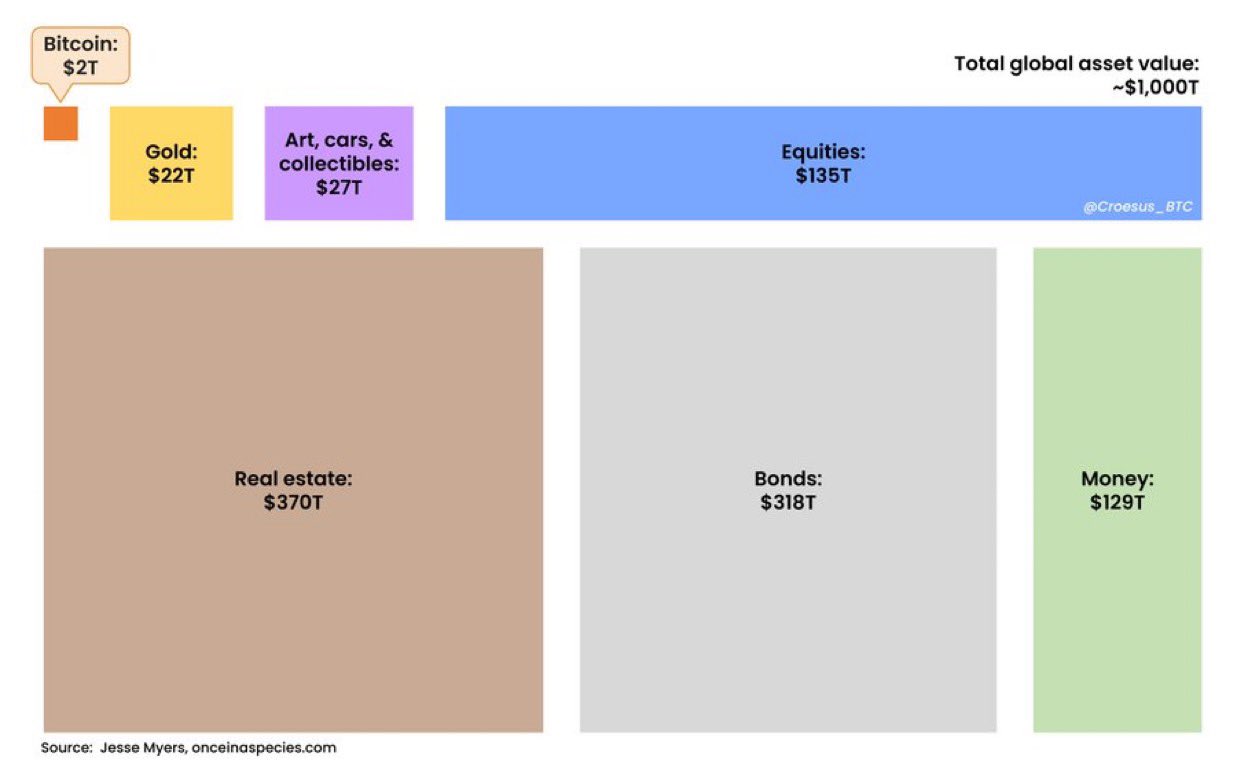Bitcoin only represents a tiny fraction of the global wealth pie and investors might still be early, a fact highlighted by Walker, host of The Bitcoin Podcast.
With a global wealth valued at about $1,000 trillion (or $1 quadrillion), Bitcoin’s market capitalization of $2 trillion accounts for just 0.2% of this massive figure.
This comparison emphasizes how early investors still are in the Bitcoin market especially considering the potential for significant growth as the asset class develops further.
The Dominance of Traditional Asset Classes
Per Walker’s assessment, real estate is by far the largest component of global wealth, representing $370 trillion, or 37% of the total. This asset class includes all forms of land, residential, and commercial properties, which have long been considered reliable stores of value.
Following real estate, bonds make up the next largest share of global wealth at $318 trillion. These financial instruments, favored for their stability, play a significant role in financial markets and are seen as a steady way to accumulate wealth over time.
Meanwhile, equities, or stocks, contribute $135 trillion to the global wealth picture. Publicly traded companies and their stock values remain a critical part of the global financial system.
Additionally, cash and other liquid assets, including bank deposits and currencies, make up $129 trillion, showing the substantial amount of readily available capital in the economy. Other categories, such as art, cars, and collectibles, come in at $27 trillion, while gold, a traditional store of value, accounts for $22 trillion in global wealth.
Bitcoin’s Scarcity and Potential
Despite Bitcoin’s small market cap compared to traditional assets, its scarcity sets it apart. With only 21 million bitcoins ever to be mined, its limited supply serves as a potential catalyst for price growth as adoption increases.
Bitcoin’s current position at just $2 trillion in market cap suggests that it’s still in its early stages of adoption. This contrasts with the established wealth represented by real estate, stocks, and bonds, which have been in place for much longer.
Walker emphasized the potential for Bitcoin’s future growth, urging his audience to buy Bitcoin now. He cautioned that failing to do so could result in purchasing at much higher prices later, driven by the fear of missing out (FOMO).
If Bitcoin’s market capitalization were to reach the same level as gold’s, its price could rise to over $1.15 million per Bitcoin. This would mean that those who delay their investment now could find themselves buying Bitcoin much later, at a significantly higher price.
JPMorgan Might be Late to Buy
Meanwhile, Michael Saylor, chairman of Strategy—one of the largest Bitcoin treasury firms—suggested that institutions like JPMorgan might eventually buy Bitcoin when its price exceeds $1 million.
He suggested that Bitcoin could hit this level before wealth managers are ready to recommend it, and $10 million before it’s widely accepted as a mainstream investment. This suggests that Bitcoin’s journey to full institutional adoption might see significant price increases in the years to come.
DisClamier: This content is informational and should not be considered financial advice. The views expressed in this article may include the author's personal opinions and do not reflect The Crypto Basic opinion. Readers are encouraged to do thorough research before making any investment decisions. The Crypto Basic is not responsible for any financial losses.




